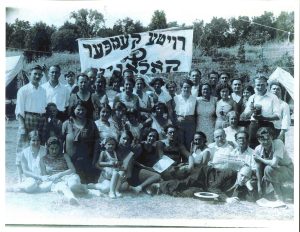MONTREAL — Elderly Soviet Jewish veterans of World War II who gathered at the YM-YWHA for a commemoration of the 65th anniversary of the Battle of the Crimea on June 26 received some excellent news.
Mark Groysberg, president of a Montreal organization of the World War II Russian-speaking veterans, told them that they and their families are now eligible for benefits from the Canadian government.
Amendments to the War Veterans Allowance Act extending benefits to all needy Allied veterans received Royal Assent on June 18, reversing a change to the law 14 years ago. The bill received the unanimous support of all parties.
In 1995, the Chrétien government amended the same act so that Allied veterans who moved to Canada after World War II were no longer eligible to apply for benefits.
Under the new changes, low-income Allied veterans of World War II (and the Korean War), who have lived in Canada for at least 10 years and live here now, may once again apply.
They are eligible for the guaranteed monthly war veterans allowance, as well as health benefits such as prescription drugs and dental care, services intended to allow veterans to remain in their own home, long-term care in an institution and funeral subsidies, the same benefits available to veterans of the Canadian forces.
Although implementation is scheduled for next January, eligible veterans and their relatives may receive payment for benefits back to Oct. 14, 2008, when the bill was passed by Parliament.
The amount of the benefits is based on such factors as location and duration of military service, health of the veteran and income. Spouses or common-law partners, or survivors, are also eligible to apply, and dependent children may also be considered.
The former Soviet Union is one of 32 countries that were allied with Britain during World War II that are listed by Veterans Affairs Canada.
The news is especially significant to the nearly 100 members of Groysberg’s association, the vast majority of whom are Jewish. Jews had a high rate of service in the Soviet military. Groyberg said upward of 500,000 Jews are believed to have served in the Red Army alone, and many emigrated to Canada after the collapse of the Soviet Union. They receive no benefits from their former country, Groysberg said.
Groysberg is not a veteran himself and was born after the war, but his parents and father-in-law served in the Soviet war effort. He is a well-known leader in the Russian Jewish community in Montreal and publisher of the Russian-language Voice of the Community newspaper.
For the past five years, he has been lobbying the federal government to change the law to once again extend veterans’ benefits to all Allied servicemen and women living here.
Some of the Soviet Jewish veterans met with Veterans Affairs Minister Greg Thompson in Ottawa in March 2008 to press their case.
The members of the organization are now very elderly, most in their late 80s and 90s, Groysberg said, but are thankful.
Groysberg sent a letter to Thompson expressing gratitude on behalf of the organization.
“Although the Russian-speaking veterans had never served in the Canadian army, they had fought in an army that was Canada’s ally, against the common enemy,” he wrote.
“That is why, as Canadian citizens, they have the right to obtain the same privileges as the rest of Canadians.”
The Crimean battle, between April 8, 1944 and May 12, 1944, was a series of offensives by the Red Army to liberate Crimea, a peninsula in the Black Sea, from German occupation.
One of the organization’s members, 87-year-old Jakov Gelfandbein, was decorated for his heroism in that bloody campaign.
For more information on the benefits, visit www.vac-acc.gc.ca or call 1-866-890-6813 (service in English), 1-866-890-9437 (service in French) or, for the hearing impaired, 1-800-465-7735.






